Yerba Mate Caffeine: Health Benefits, Risks & Energy Explained
Dec 29, 2023
Wondering how much caffeine is in yerba mate—and whether it’s actually good for you? You’re not alone.
From tea bags and canned drinks to ultra-concentrated extracts like Unimate, yerba mate is gaining serious attention for its smooth energy, health benefits, and even cancer-related questions.
In this complete guide, you’ll learn how yerba mate caffeine compares to coffee and tea, what the latest research says, and how to enjoy it safely for maximum results.
What Is Yerba Mate and Why Is It So Popular?
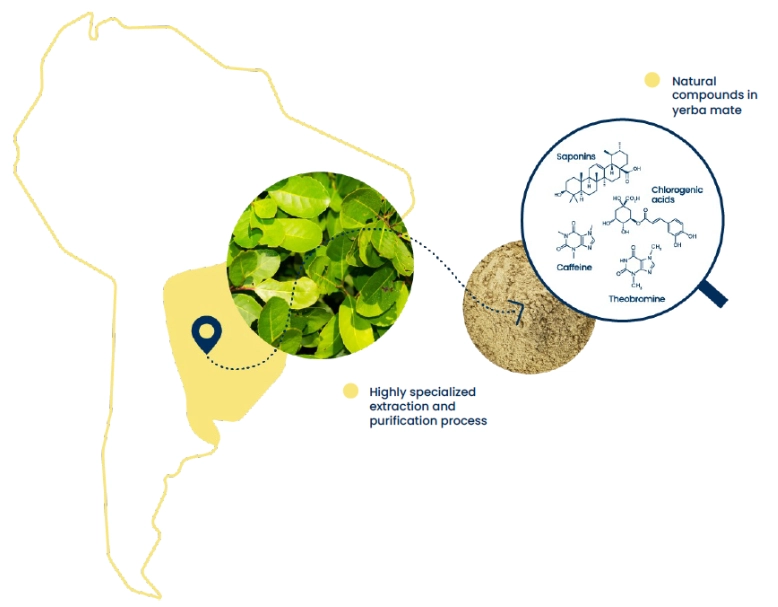
Yerba mate tea is a traditional South American beverage made from the leaves of the Ilex paraguariensis plant. Known for its smooth energy and mental clarity, yerba mate has been consumed for centuries in countries like Argentina, Paraguay, and Brazil as part of daily rituals and social gatherings.
Unlike other herbal teas, yerba mate contains natural caffeine—often referred to as yerba caffeine or yerba tea caffeine—which gives it a unique place between coffee and green tea. It offers the alertness of coffee without the jitters, thanks to a blend of stimulating compounds like theobromine and theophylline.
How Much Caffeine Is in Yerba Mate?
Yerba mate contains roughly 70 to 90 mg of caffeine per traditionally brewed cup—similar to coffee, though stronger brews can reach 120 mg. But that number varies based on how it's prepared. Tea bags generally contain 30 to 50 mg, canned drinks range from 60 to 160 mg, and loose-leaf brews often deliver the most caffeine per serving.
Factors like leaf quality, steeping time, and water temperature all affect the final caffeine level—making it important to choose the right preparation for your energy needs.
Yerba Mate Tea Bags, Cans, and Loose Leaf—Which Has the Most Caffeine?
Not all yerba mate products are created equal when it comes to caffeine content. Some deliver a mild lift, while others pack a serious punch.
Tea bags typically contain the least caffeine—around 30 to 50 mg per cup—because they use smaller amounts of leaf. This makes them a gentler choice for anyone seeking a lighter energy boost.
Canned yerba mate drinks are more variable. Depending on the brand, added sweeteners, and stimulants, the caffeine content can range from 60 to 160 mg per can. Many of these ready-to-drink products are also carbonated and may contain synthetic caffeine or other additives to artificially enhance energy.
Loose-leaf yerba mate, traditionally brewed in a gourd or steeped in a French press, tends to be the most potent and customizable. With higher leaf quantities and longer steeping times, a single serving can deliver between 80 to 120 mg of caffeine.
So, how much caffeine is in a yerba mate can versus loose leaf or a tea bag? It all depends on the source, preparation method, and leaf quality—so choose what best matches your energy needs and lifestyle.
Is Yerba Mate High in Caffeine—or Safer Than Coffee?
One of the most common questions people ask is: “Is yerba mate high in caffeine?” The answer is yes—but with a twist.
Yerba mate does have caffeine, comparable to a cup of coffee. However, the way it affects your body and mind is noticeably different. That’s because yerba mate contains more than just caffeine—it also includes theobromine and theophylline, two naturally occurring compounds that support a more balanced, sustained energy boost.
Unlike the sharp jolt and crash many people experience with coffee, yerba mate tends to deliver a smoother, longer-lasting sense of alertness. It's often described as providing mental clarity without the jitters or anxiety that can come from drinking too much coffee.
So, is yerba mate caffeinated? Absolutely. But for many people, it feels safer, gentler, and more manageable than traditional coffee or energy drinks—especially when sourced and prepared with quality in mind.
Yerba Mate Health Benefits Beyond Caffeine
While many turn to yerba mate for its energizing effects, the true power of this traditional drink lies in its broad health benefits—far beyond just caffeine.
Yerba mate is packed with antioxidants, including polyphenols and chlorogenic acids, which help fight oxidative stress and support overall cellular health. In fact, some studies suggest that yerba mate antioxidants may rival those found in green tea.
Here are a few of the most researched and widely recognized yerba mate benefits:
- Immune support: Thanks to its high antioxidant content, yerba mate helps your body defend against illness and inflammation.
- Mental focus and mood enhancement: The unique blend of caffeine, theobromine, and theophylline promotes alertness without anxiety.
- Metabolic boost: Yerba mate has been shown to support fat oxidation, making it a natural ally in weight management.
- Heart health: Studies indicate that yerba mate may improve cholesterol profiles and reduce markers of cardiovascular stress.
- Blood sugar regulation: Regular consumption may improve insulin sensitivity and help stabilize glucose levels.
And if you're choosing organic yerba mate tea, you're also avoiding pesticides and chemical additives—making the benefits even stronger for those seeking a natural, whole-body wellness solution.
What About Yerba Mate and Cancer?
With its rising popularity, some people have raised concerns: Is yerba mate bad for you? The answer isn’t black and white—but context is key.
The primary yerba mate cancer concern stems from a handful of studies linking very high consumption of extremely hot yerba mate to an increased risk of esophageal cancer. However, the issue appears to be more about the temperature than the tea itself. Hot beverages of any kind—coffee and tea included—can irritate the esophagus and potentially raise cancer risk when consumed repeatedly at scalding temperatures.
Another factor is the presence of polycyclic aromatic hydrocarbons (PAHs) in some traditional yerba mate products. These compounds are also found in grilled meats and tobacco smoke. However, high-quality yerba mate—especially products like Unimate that go through a purification process—contain far lower levels of PAHs.
So while the headlines may cause alarm, the science suggests that moderate consumption of yerba mate at safe temperatures is not only unlikely to be harmful—it may actually be beneficial.
For a deeper look into this topic, read my full blog article: Is Yerba Mate Bad for You? Exploring the Link Between Yerba Mate and Cancer
What Makes Unimate Different from Other Yerba Mate Products?
With so many yerba mate products on the market—tea bags, canned drinks, loose-leaf blends—it’s natural to wonder how they all compare. If you’re looking for consistency, potency, and purity, Unimate stands in a category of its own.
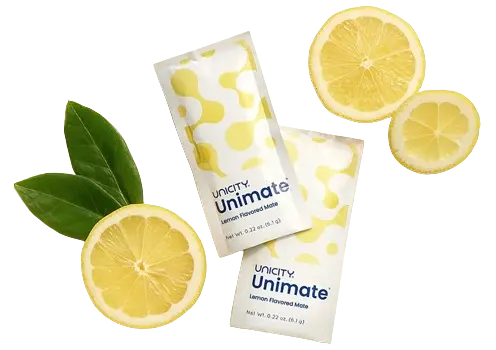
Unlike traditional yerba mate preparations, Unimate is made using a proprietary five-step process: Handpicking → Fire Roasting → Extracting → Concentrating → Purifying. This process enhances the natural benefits of yerba mate while significantly reducing contaminants like PAHs.
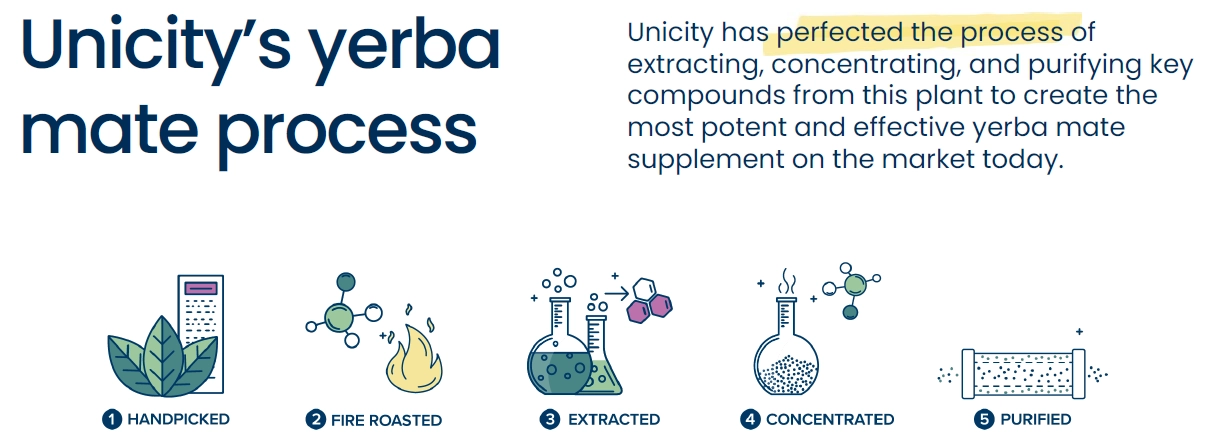
Unimate delivers significantly more theobromine and chlorogenic acids compared to leading commercial yerba mate brands—without the added sugars, carbonation, or synthetic ingredients found in many yerba mate ready-to-drink mainstream brands.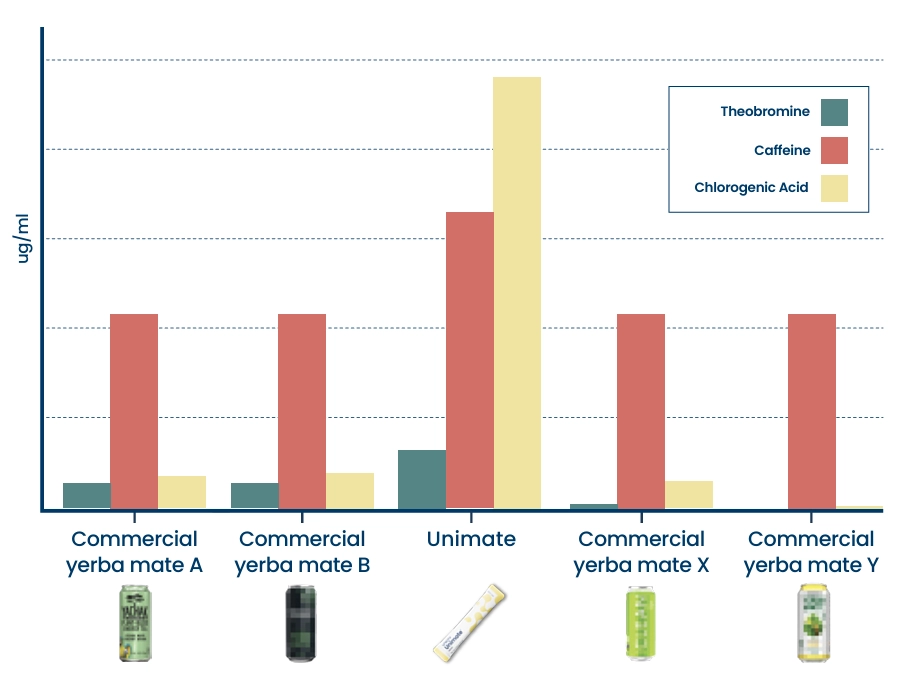
Unimate yerba mate stands apart as a highly purified, ultra-concentrated yerba mate extract. It delivers consistent energy, enhanced focus, and measurable health benefits—offering a cleaner, more effective way to fuel your day.
Backed by clinical research, including a study conducted at the University of Zurich, Unimate has been shown to support improved mood, mental performance, and metabolic response. Participants in the Zurich trial reported increased alertness, elevated resilience to stress, and sustained energy—without the crash associated with coffee or energy drinks.
As a result, Unimate delivers more active ingredients—especially chlorogenic acids and theobromine—than any other yerba mate drink on the market.
Whether you're comparing Unimate vs. other yerba mate products for energy, focus, or metabolic support, the numbers speak for themselves.
And while the yerba mate drink caffeine content in Unimate is similar to premium coffee (around 80–100 mg), its effects are noticeably smoother—thanks to theobromine, a natural mood-enhancing compound also found in dark chocolate.
With no added sugars, no synthetic caffeine, and science-backed benefits, Unimate is more than a beverage—it’s a functional health tool.
Yerba Mate Nutritional Profile: Vitamins, Minerals, and Antioxidants
Yerba mate is more than just a caffeine source—it’s a powerhouse of naturally occurring nutrients that contribute to its reputation as a functional health drink.
In addition to caffeine, yerba mate contains:
- Chlorogenic acids, powerful antioxidants that support metabolism, reduce oxidative stress, and help regulate blood sugar
- Theobromine, a compound also found in dark chocolate that promotes mood, focus, and a steady energy lift
- Polyphenols, which support inflammation control and cellular health
- Amino acids, vitamins (like B1 and B2), and minerals (including potassium, magnesium, and manganese)
This rich nutritional profile explains why yerba mate is often compared to green tea and matcha in terms of wellness benefits. For those seeking organic yerba mate tea benefits without added sugars or synthetic enhancers, high-quality products like Unimate deliver clean, concentrated support for both mind and body.
Want to see how Unimate captures and amplifies these natural nutrients? Read my full breakdown on Unimate Ingredients and Benefits. For science-backed details on chlorogenic acids, check out my post on Unimate’s Energy and Focus Benefits.
Try Unimate: The Smarter Way to Energize Your Day
If you’re ready to experience clean, focused energy without the crash, Unimate is the upgrade your routine has been missing.
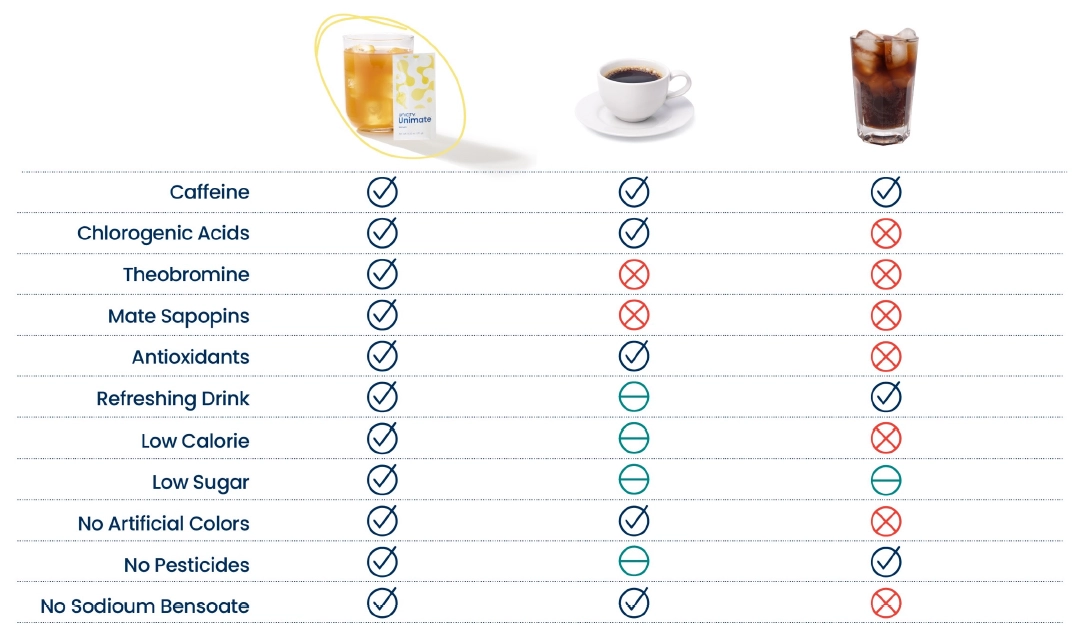
This isn’t just another yerba mate tea. Unimate delivers up to 10x the active compounds, thanks to its purified, ultra-concentrated formula—and it’s the only yerba mate listed in the Prescribers’ Desk Reference. Whether you’re looking to sharpen your mind, support metabolic health, or feel more in control of your day, Unimate is built to help you do more—with less stress and more clarity.
Thousands have already made the switch. The next great day could start with one packet of Unimate.
Order Unicity Unimate at the lowest discounted Wholesale Pricing and Satisfaction Guaranteed!
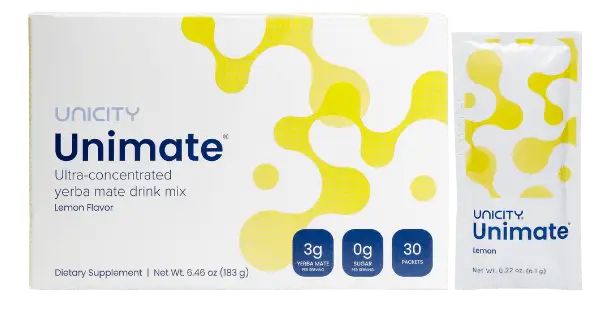
Unicity Unimate
Yerba Mate Drink
1 Box | 30 Packets
Yerba Mate FAQ: Your Top Questions Answered
Q: How much caffeine is in yerba mate?
Yerba mate typically contains between 70–90 mg of caffeine per cup, though stronger brews can exceed 100 mg. Caffeine levels depend on the leaf quality, preparation method, and serving size.
Q: Does yerba mate have more caffeine than coffee?
On average, coffee has slightly more caffeine than yerba mate per cup, but yerba mate provides a smoother, longer-lasting effect due to theobromine and other natural compounds.
Q: Is yerba mate caffeinated or caffeine free?
Yerba mate is naturally caffeinated. It’s not caffeine-free unless specifically processed to be so (which is rare).
Q: Do yerba mate tea bags have less caffeine than loose leaf?
Yes. Tea bags contain less leaf material, usually yielding 30–50 mg of caffeine versus 70–100+ mg in traditionally brewed loose-leaf mate.
Q: Is it safe to drink yerba mate every day?
Yes—for most healthy adults, moderate daily consumption of yerba mate is considered safe. Avoid extremely hot temperatures and choose high-quality, purified products like Unimate to minimize risk.
Q: What is the difference between yerba mate and Unimate?
Unimate is an ultra-concentrated, purified form of yerba mate, delivering consistent benefits with significantly more chlorogenic acids and theobromine—without added sugar or synthetic caffeine.
Q: Can I drink yerba mate while intermittent fasting?
Yes. Unsweetened yerba mate, including Unimate, is safe to consume during intermittent fasting and may even support fat burning and appetite control. In fact, Unimate has been studied for its potential to reduce appetite and improve metabolic response—download the study titled Effect of Unimate on acute appetite suppression among adults. For a deeper dive into how yerba mate fits into fasting routine, see Chapter 9 of my book, Beyond Feel Great, where I explore the science behind intermittent fasting and how to use yerba mate for enhanced results.
Q: Does yerba mate give you energy without jitters?
Yes. Unlike coffee, yerba mate contains theobromine, which helps deliver calm, focused energy without the spikes and crashes.
Q: Is there caffeine in mate tea, or is it just herbs?
Yes, mate tea contains natural caffeine, along with other plant compounds that enhance mental clarity and energy.
Ready to Feel Better Than You Have in Years?
Try the Feel Great System Today
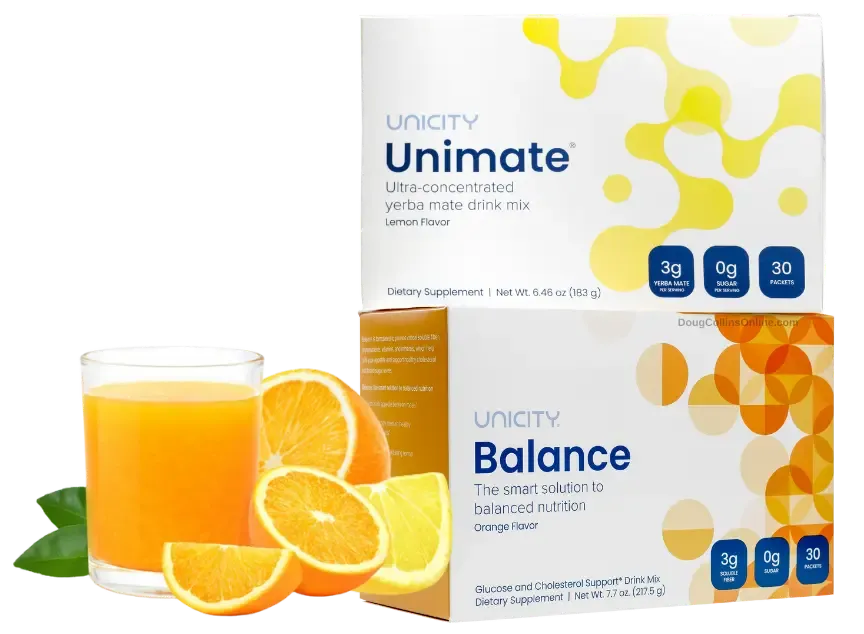
More energy. Better focus. Healthy blood sugar support. Sustainable weight loss.
Even if everything else you tried before has failed.
Order now with a 100% satisfaction guarantee.
Have questions? Contact Doug:
Click the Message/Chat Button
Send Email


